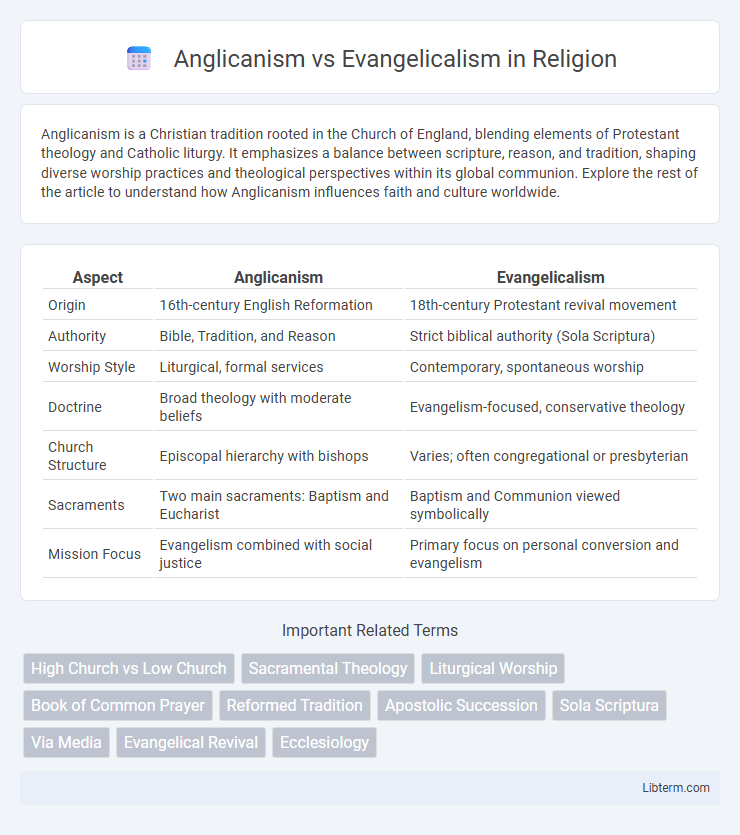Anglicanism is a Christian tradition rooted in the Church of England, blending elements of Protestant theology and Catholic liturgy. It emphasizes a balance between scripture, reason, and tradition, shaping diverse worship practices and theological perspectives within its global communion. Explore the rest of the article to understand how Anglicanism influences faith and culture worldwide.
Table of Comparison
| Aspect | Anglicanism | Evangelicalism |
|---|---|---|
| Origin | 16th-century English Reformation | 18th-century Protestant revival movement |
| Authority | Bible, Tradition, and Reason | Strict biblical authority (Sola Scriptura) |
| Worship Style | Liturgical, formal services | Contemporary, spontaneous worship |
| Doctrine | Broad theology with moderate beliefs | Evangelism-focused, conservative theology |
| Church Structure | Episcopal hierarchy with bishops | Varies; often congregational or presbyterian |
| Sacraments | Two main sacraments: Baptism and Eucharist | Baptism and Communion viewed symbolically |
| Mission Focus | Evangelism combined with social justice | Primary focus on personal conversion and evangelism |
Historical Origins: Anglicanism and Evangelicalism
Anglicanism originated in the early 16th century during the English Reformation, established under King Henry VIII as a distinct branch of Christianity separating from the Roman Catholic Church. Evangelicalism emerged much later, emphasizing a revival movement within Protestantism in the 18th century, characterized by a focus on personal conversion, biblical authority, and active evangelism. While Anglicanism serves as a broad church tradition with historical ties to England's monarchy, Evangelicalism spans multiple denominations and is defined more by theological emphasis than by institutional structure.
Core Doctrines and Beliefs
Anglicanism emphasizes a balance of Scripture, tradition, and reason, upholding the Nicene and Apostles' Creeds and practices such as the sacraments of baptism and Eucharist as means of grace. Evangelicalism centers on the authority of the Bible alone (sola scriptura), the necessity of personal conversion, and the centrality of Christ's atoning death for salvation. Both traditions affirm the Trinity and Christ's resurrection but differ in liturgical expressions and views on church authority and sacramental theology.
Worship Styles and Liturgy
Anglican worship styles emphasize formal liturgy, often centered around the Book of Common Prayer, featuring structured prayers, sacraments, and traditional hymns that reflect a historic and sacramental approach. Evangelical worship prioritizes a more informal, contemporary style that includes spontaneous prayers, modern worship music, and sermon-focused services designed to foster personal faith experiences and active congregational participation. The liturgical differences highlight Anglicanism's connection to historical church traditions, whereas Evangelicalism emphasizes relational and experiential worship dynamics.
Authority of Scripture
Anglicanism holds the authority of Scripture as central but interprets it through tradition and reason within the "three-legged stool," balancing biblical text with church teachings and historical context. Evangelicalism emphasizes the absolute authority and inerrancy of Scripture, prioritizing a personal, direct interpretation based on the Bible alone (sola scriptura). This fundamental difference shapes Anglican openness to liturgical practices and doctrine development, contrasted with Evangelicalism's focus on scripture as the sole rule of faith and practice.
Role of Tradition
Anglicanism places a strong emphasis on tradition, valuing the historic creeds, liturgies, and the authority of the early Church Fathers as essential components of faith and practice. Evangelicalism prioritizes the authority of Scripture over tradition, often viewing traditions as secondary or even potentially obstructive to the clear message of the Bible. This divergence leads Anglicans to maintain structured worship and sacramental theology, while Evangelicals emphasize personal Bible study and direct experience of faith.
Church Governance and Structure
Anglicanism features a hierarchical church governance system led by bishops, with the Archbishop of Canterbury as a key figure, while maintaining a balance of episcopal authority and synodical participation by clergy and laity. Evangelicalism lacks a unified church structure, emphasizing congregational autonomy and local church leadership, often governed by elders or pastors without a formal episcopal hierarchy. This distinction highlights Anglicanism's structured, historic polity versus Evangelicalism's flexible, decentralized approach to church governance.
Sacraments and Ritual Practices
Anglicanism emphasizes the sacramental system with two primary sacraments--Baptism and Eucharist--and recognizes additional sacramental rites such as Confirmation, Marriage, and Ordination, underscoring a liturgical worship style rooted in the Book of Common Prayer. Evangelicalism prioritizes personal faith and scripture authority, often practicing only Baptism and the Lord's Supper as ordinances rather than sacraments, reflecting a simpler, less ritualistic worship approach. The distinct theological views influence ritual practices where Anglicanism retains structured liturgies and formal rites, while Evangelicalism embraces more spontaneous and informal expressions of worship.
Perspectives on Salvation
Anglicanism emphasizes a balance between faith, sacraments, and good works in the process of salvation, rooted in both Scripture and Church tradition. Evangelicalism centers on personal faith in Jesus Christ as the sole means of salvation, stressing the necessity of a born-again experience and the authority of Scripture alone. While Anglicanism allows for a broader theological spectrum, Evangelicalism maintains a more defined doctrine of justification by faith alone.
Social Engagement and Mission
Anglicanism integrates a broad spectrum of social engagement initiatives, emphasizing charitable work, community development, and advocacy for social justice through established church structures worldwide. Evangelicalism prioritizes personal conversion and active missionary work, often engaging in evangelism, church planting, and humanitarian efforts tailored to local needs and rapid outreach. Both traditions contribute significantly to global mission fields, though Anglicanism tends to approach social issues through systemic and institutional means, whereas Evangelicalism focuses on grassroots revival and individual transformation.
Contemporary Challenges and Future Directions
Anglicanism faces contemporary challenges such as maintaining doctrinal unity amid theological diversity and addressing declining membership in Western contexts. Evangelicalism contends with cultural relevance, balancing traditional biblical interpretations with social justice issues and growing secularism. Both traditions explore future directions emphasizing global mission expansion, digital engagement, and fostering interdenominational dialogue to sustain faith communities.
Anglicanism Infographic

 libterm.com
libterm.com